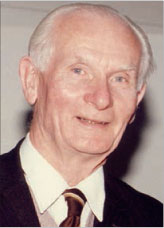Serviços Personalizados
Artigo
Indicadores
Links relacionados
-
 Citado por Google
Citado por Google -
 Similares em Google
Similares em Google
Compartilhar
SAMJ: South African Medical Journal
versão On-line ISSN 2078-5135
versão impressa ISSN 0256-9574
SAMJ, S. Afr. med. j. vol.103 no.2 Pretoria Fev. 2013
OBITUARIES
William Fraser Ross

Professor Fraser Ross died on 2 October 2012, weeks before his 90th birthday, and after a few years of deteriorating health which he bore with stoicism and dignity. Born in Monifieth, Scotland, Fraser excelled athletically and academically at school and university. On the prestigious Harkness Scholarship, he attended the University of St Andrews, graduating with a BSc and MB ChB in 1946. His distinguished medical career was almost entirely spent in Africa where he served patients, colleagues, students and communities with distinction, loyalty and commitment.
Fraser joined the National Institute of Medical Research in London and settled in Southern Rhodesia in 1948, initially working at the Blair Research Centre to investigate Miracil D in treating schistosomiasis. He returned to clinical medicine in the Government Medical Service at various rural and urban hospitals before his appointment, in 1950, as Head of Maternity at Harare Central Hospital. His interest in public health led him to acquire the DPH (with distinction) from the University of London in 1953.
He was appointed as medical superintendent of the Memorial Hospital in Bulawayo in 1955 and then the newly built Mpilo Central Hospital in 1958, where he remained until 1965. Fraser was a highly competent medical administrator and Mpilo Hospital became a favoured institution for the further training of resident medical officers and registrars. His influence extended beyond the hospital to the entire province of Matabeleland.
In 1966, Fraser was appointed the first Professor and Head of the Department of Social and Preventive Medicine, which later became the Department of Community Medicine, of the Godfrey Huggins School Medicine at the University College of Rhodesia. He served there, with distinction, until retiring in January 1985 from the then University of Zimbabwe. He was Dean of the Faculty of Medicine from 1969 to 1973.
He was a member of the Medical Council of Rhodesia and later Zimbabwe from 1963 to 1985 and was its president from 1973 to 1985.
Fraser was well respected in academic circles and was external examiner in community medicine at the universities of Cape Town, the Witwatersrand, Zambia, Dar Es Salaam and Medunsa. He was honoured for his contribution to public health with the FFCM (UK) in 1974 and the FRCP (Edinburgh) in 1985. He was the lead author of some 50 published articles on diverse subjects, including tropical diseases, epidemiology, medical education and nurse training. On his retirement, Fraser was appointed the first Emeritus Professor of the University of Zimbabwe.
In 1985, Fraser and his wife Joan emigrated to South Africa. He accepted the post of Medical Superintendent of the Brooklyn Chest Hospital in Cape Town, where he remained until December 1990.
Fraser and Joan met in Salisbury and were happily married for 61 years, when Joan died. He is survived by his two children Fiona, a chartered accountant in London, and Mary, a public and occupational health specialist; Barry Metcalfe, his son-in-law; two grandchildren, Stephen and Joanna; and great-grandson, Brent, to all of whom we extend our condolences.
Fraser was the quintessential Scotsman, enormously proud of his heritage; he never lost his accent in his 63 years in Africa. He undertook everything with enthusiasm, and was known for his industriousness, commitment and attention to detail. He could be a hard task master but his enduring qualities were his loyalty and fairness. He was a genial companion with a great sense of humour. His legacy will remain forever in his contribution to medical education and the health services in Zimbabwe.
David Williamson














